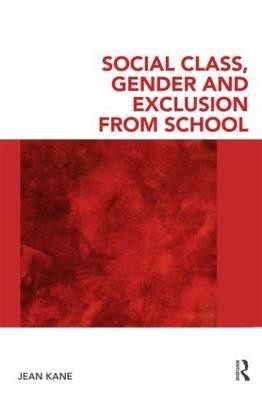
- We will send in 10–14 business days.
- SAVE -10% with code: EXTRA
Reviews
Description
Rising exclusion rates indicate the continuing marginalisation of many young people in education in the UK. Working-class boys, children living in poverty, and children with additional/special educational needs are among those experiencing a disproportionate rate of exclusion. This book traces the processes of exclusion and alienation from school and relates this to a changing social and economic context.
Jean Kane argues that policy on schooling, including curricular reform, needs to be re-connected to the broad political pursuit of social justice, and presents compelling case studies of excluded pupils, showing the multi-faceted identities of pupils, with a particular focus on masculine and feminine identities.
This invaluable contribution to the literature offers an alternative analysis where the social identities of pupils are shown to be tied up with their exclusion from school. Themes investigated include:
- the meanings of school exclusions
- social class, gender and schooling
- social identities of excluded pupils
- negotiating identities in school: moving towards exclusion
- exclusions and young people's lives
- improving participation in schooling.
Providing fascinating reading for teachers, social workers, researchers and policy-makers this book considers how educational disadvantage might be addressed through recognition of the gender and class identities of pupils.
EXTRA 10 % discount with code: EXTRA
The promotion ends in 18d.02:04:43
The discount code is valid when purchasing from 10 €. Discounts do not stack.
- Author: Jean Kane
- Publisher: Routledge
- ISBN-10: 0415553024
- ISBN-13: 9780415553025
- Format: 15.6 x 23.4 x 0.9 cm, softcover
- Language: English English
Rising exclusion rates indicate the continuing marginalisation of many young people in education in the UK. Working-class boys, children living in poverty, and children with additional/special educational needs are among those experiencing a disproportionate rate of exclusion. This book traces the processes of exclusion and alienation from school and relates this to a changing social and economic context.
Jean Kane argues that policy on schooling, including curricular reform, needs to be re-connected to the broad political pursuit of social justice, and presents compelling case studies of excluded pupils, showing the multi-faceted identities of pupils, with a particular focus on masculine and feminine identities.
This invaluable contribution to the literature offers an alternative analysis where the social identities of pupils are shown to be tied up with their exclusion from school. Themes investigated include:
- the meanings of school exclusions
- social class, gender and schooling
- social identities of excluded pupils
- negotiating identities in school: moving towards exclusion
- exclusions and young people's lives
- improving participation in schooling.
Providing fascinating reading for teachers, social workers, researchers and policy-makers this book considers how educational disadvantage might be addressed through recognition of the gender and class identities of pupils.


Reviews